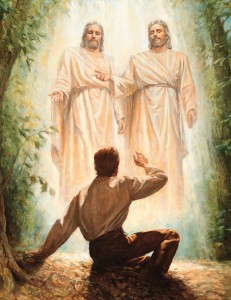The Church’s General Conference (a meeting that is broadcast from Salt Lake City to all over the world) was in October. It is in October and April every year. Maybe you are thinking to yourselves “what, exactly, do the prophets and apostles have to say in our day?” Well, here is a snippet.

Elder David A. Bednar talked about how we can do better in our families to teach, love and discipline effectively and sincerely.
Here is one of my favorite parts of the talk:
As our sons were growing up, our family did what you have done and what you now do. We had regular family prayer, scripture study, and family home evening. Now, I am sure what I am about to describe has never occurred in your home, but it did in ours.
Sometimes Sister Bednar and I wondered if our efforts to do these spiritually essential things were worthwhile. Now and then verses of scripture were read amid outbursts such as “He’s touching me!” “Make him stop looking at me!” “Mom, he’s breathing my air!” Sincere prayers occasionally were interrupted with giggling and poking. And with active, rambunctious boys, family home evening lessons did not always produce high levels of edification. At times Sister Bednar and I were exasperated because the righteous habits we worked so hard to foster did not seem to yield immediately the spiritual results we wanted and expected.
Today if you could ask our adult sons what they remember about family prayer, scripture study, and family home evening, I believe I know how they would answer. They likely would not identify a particular prayer or a specific instance of scripture study or an especially meaningful family home evening lesson as the defining moment in their spiritual development. What they would say they remember is that as a family we were consistent.
Sister Bednar and I thought helping our sons understand the content of a particular lesson or a specific scripture was the ultimate outcome. But such a result does not occur each time we study or pray or learn together. The consistency of our intent and work was perhaps the greatest lesson—a lesson we did not fully appreciate at the time.
In my office is a beautiful painting of a wheat field. The painting is a vast collection of individual brushstrokes—none of which in isolation is very interesting or impressive. In fact, if you stand close to the canvas, all you can see is a mass of seemingly unrelated and unattractive streaks of yellow and gold and brown paint. However, as you gradually move away from the canvas, all of the individual brushstrokes combine together and produce a magnificent landscape of a wheat field. Many ordinary, individual brushstrokes work together to create a captivating and beautiful painting.
Each family prayer, each episode of family scripture study, and each family home evening is a brushstroke on the canvas of our souls. No one event may appear to be very impressive or memorable. But just as the yellow and gold and brown strokes of paint complement each other and produce an impressive masterpiece, so our consistency in doing seemingly small things can lead to significant spiritual results. “Wherefore, be not weary in well-doing, for ye are laying the foundation of a great work. And out of small things proceedeth that which is great” (D&C 64:33). Consistency is a key principle as we lay the foundation of a great work in our individual lives and as we become more diligent and concerned in our own homes.
Here are some links to read the talk, listen to it, or watch him as he gave it.
Hearing the words of the Lord’s prophets and apostles strengthens my faith and helps me live my life in accordance to God’s will for me. I hope you’ll take some time to listen to a talk or two as well. Here is a link to the whole conference.
